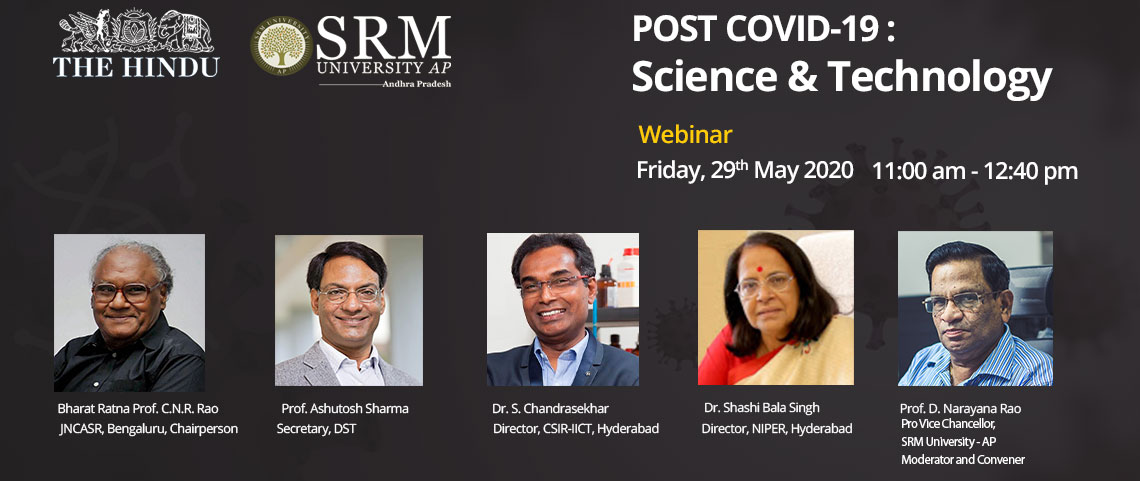Translational research is the key to thrive in Post COVID-19 era
SRM University AP, Andhra Pradesh, in association with The Hindu, organized the webinar to rethink the strategies for nurturing a scientific landscape in the post COVID situation. The webinar was chaired by Bharat Ratna Prof. CNR Rao, Linus Pauling Research Professor at JNCASR, Bangalore. Prof. Asuthosh Sharma, Secretary to Government of India, Department of Science & Technology (DST), Dr. S. Chandra Sekhar, Director, CSIR – Indian Institute of Chemical Technology, Hyderabad and Dr. Shashi Bala Singh, Director, NIPER, Hyderabad were the invited speakers. Prof. D. Narayana Rao, Pro Vice-Chancellor of SRM University – AP has initiated this webinar and was the moderator and Convener for the Webinar.

Prof. D. Narayana Rao expressed his gratitude to the prolific visionaries and scientists for being the panelists for the webinar and welcomed them heartily. In his opening speech, he emphasized the dire need for international collaborations. He further says, “India could definitely consider this as a potential opportunity and the Scientists, Technologists, Engineers, Bureaucrats and Policy Makers can reinvent the ways of doing research on Science & Technology. Breaking silos and collaboration among various sectors of Indian industries and academia to find solutions is crucial.” Prof. Rao also informed that CSIR Laboratories and outfits like BIRAC has built a strong bioscience foundation with a robust and start-up corporate base. He ardently believes that in a way COVID-19 Pandemic crises have catalyzed India and its Scientific Community.
Bharat Ratna recipient- Prof. CNR Rao believes in an empowered youth, a potential that if trained and utilized right can do marvels. He believes that human intelligence and determination can defeat COVID-19. He says, “Although this pandemic imposed a temporary slow down, it cannot diminish the intelligence and determination of the scientific community. Science is the urge of people to create and innovate which would keep shimmering even after lockdown.” Prof. CNR Rao supposes that India has to become competitive and futuristic and that the future of India depends on its zeal to be on the top.
 Prof. D. N. Rao conducting the webinar
Prof. D. N. Rao conducting the webinar
According to Prof. CNR Rao, India today is marginal in science contribution. The scientists of the country should engage in 3 types of research: frontiers of science to combat COVID directly, research that helps in improving the important sectors of India, and domains where India has the potential to beat the rest of the world to be on top. He also attests that India should spend at least 2% of its GDP to promote Scientific and technological research. He concludes by saying, “The scientists need to think with their minds and consciousness. Those who don’t give up, end up achieving success.”
Prof. Sharma pointed out that Covid-19 days have taught us to adopt a problem-centric approach rather than a tool-centric approach. He says, “The future is about the convergence of science and technology. We should understand the fundamental challenges and use the opportunity.”. Prof. Sharma recommends that research should be profound and generate new ideas instead of incremental focus, along with having a socio-economic relevance. He further suggests, “Foundation of culture and confidence should be built. Best training should be provided, creative thinking and risk-taking abilities should be nurtured, systems should be able to absorb losses, and knowledge should be translated to meet the demands of the market.”
Dr. Chandra Sekhar says that in the Co-COVID era, the pursuit of science should be making the people future-ready. Cutting edge research is to be used to combat pandemics in the future. He says that, “Pandemics are going to happen. AI model, computational tools should be used to predict virus mutations and alerts should be given to researchers to prepare a vaccine beforehand. “
Dr. Shashi Bala aligns her speech to the same thread by saying, “For any country to be prosperous, science, technology and innovation are crucial. Indian R&D sector is very vibrant and we have the capabilities to be self-reliant in the sectors of Food and agriculture, biomedical equipment, and pharmaceuticals. All the stakeholders, funding agencies, ministries, government bodies, academia, R&D institutes should come together proactively and exhibit a participatory approach. We should not slow down this tempo which has already been built in the system across all stakeholders. We need to be gearing up our systems to create an ecosystem that is economically and financially vibrant in the co-COVID and post-COVID era.” Dr. Shashi Bala emphasizes that translational research should be made mandatory by the funding agencies. According to her, the main aim of translational research is to promote health and quality of life. Translational research can make a contribution by conforming to basic sciences and testing hypothesis in pre-clinical models. She concludes, “ This crisis has made us realize the phrase, “health is wealth.” We need to be self-reliant in terms of raw materials. We need to facilitate the domestic manufacturing of medical equipment. Fast-tracking of approvals and validation of prototypes are necessary. We need to promote interdisciplinary and inter-institutional research. Industrial participation at an early stage of research can also help in funding and commercialization of products.”

